Space Lynx
Astronaut
- Joined
- Oct 17, 2014
- Messages
- 18,300 (4.70/day)
- Location
- Kepler-186f
| Processor | 7800X3D -25 all core ($196) |
|---|---|
| Motherboard | B650 Steel Legend ($189) |
| Cooling | RZ620 (White/Silver) ($32) |
| Memory | 32gb ddr5 (2x16) cl 30 6000 ($80) |
| Video Card(s) | Merc 310 7900 XT @3200 core -.75v ($705) |
| Display(s) | Agon QHD 27" QD-OLED Glossy 240hz ($399) |
| Case | NZXT H710 (Black/Red) ($62) |
| Power Supply | Corsair RM850x ($109) |
Maybe they could upload a version with no Ukranian in it in the meantime, so at least others could use it while it's being fixed?
you would think so, but I guess their brains don't work that way. stupid as fuck






